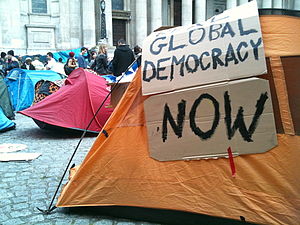| Occupy London | |
|---|---|
| Part of the Occupy movement | |
 Occupy London Tent | |
| Date | 15 October 2011 – 14 June 2012 |
| Location | London, England, United Kingdom |
| Caused by | Economic inequality, corporate influence over government, inter alia. |
| Methods | Demonstration, occupation, protest, street protesters |
| Status | Ended |
| Number | |
| Thousands (at peak in Oct & Nov 2011)[1] | |
Occupy London was a political movement in London, England, and part of the international Occupy movement. While some media described it as an "anti-capitalist" movement,[2] in the statement written and endorsed by consensus by the Occupy assembly in the first two days of the occupation, occupiers defined themselves as a movement working to create alternatives to an "unjust and undemocratic" system.[3] A second statement endorsed the following day called for "real global democracy".[4] Due to a pre-emptive injunction, the protesters were prevented from their original aim to camp outside the London Stock Exchange. A camp was set up nearby next to St Paul's Cathedral. On 18 January 2012, Mr Justice Lindblom granted an injunction against continuation of the protest[5] but the protesters remained in place pending an appeal.[6] The appeal was refused on 22 February,[7] and just past midnight on 28 February, bailiffs supported by City of London Police began to remove the tents.[8]
The protests began in solidarity with the Occupy Wall Street protests in New York, United States, and with support from tax avoidance protest group UK Uncut and the London-based contingent of the Spanish 15M movement.[9][10] In October protesters established a second encampments in Finsbury Square just to the north of the City of London. In November, a third site was opened in a disused office complex owned by UBS. Named by protesters as the Bank of Ideas, the site was located in Hackney and was evicted in late January 2012.[11]
A fourth site was established in late December, at the disused premises of Old Street Magistrates Court in east London. The site's owners objected to its proposed long-term use by occupiers, and agreement was reached for the building to be vacated by the end of January 2012.[12] In February 2012, occupiers were evicted from their main camp at St Paul's, and from the Bank of Ideas, leaving Finsbury Square as the last London site to remain occupied.[13] The Finsbury Square camp was cleared by authorities in June 2012.[14]
- ^ ""Occupy Wall Street" protest spreads to London". Xinhua. 15 October 2011. Archived from the original on 18 October 2011. Retrieved 15 October 2011.
- ^ Cite error: The named reference
occupy-londonwas invoked but never defined (see the help page). - ^ "Initial Statement". Retrieved 4 August 2021.
- ^ "United for Global Democracy". Retrieved 4 August 2021.
- ^ City of London v Samede & Ors [2012] EWHC 34 (QB) (18 January 2012). Bailii.org. Retrieved on 2013-08-12.
- ^ "What next for Occupy London protesters?". BBC News. 18 January 2012.
- ^ "Occupy London St Paul's eviction appeal bid thrown out". BBC News online. 22 February 2012.
- ^ "St Paul's protest: Occupy London camp evicted". BBC. 28 February 2012. Retrieved 28 February 2012.
- ^ "Anti-corporate protests to hit London". The Sydney Morning Herald. Agence France-Presse. 12 October 2011. Retrieved 12 October 2011.
Protests against corporate power that have taken hold in the US are to hit Britain on Saturday with a rally in front of the London Stock Exchange. Occupy London Stock Exchange (OccupyLSX) [...] is backed by British anti-austerity group UK Uncut, the London-based Assembly of the Spanish 15M movement and the People's Assemblies Network Global Day of Action.
- ^ "Occupy London protests in financial district". BBC News. 15 October 2011. Retrieved 15 October 2011.
- ^ Jessica Winch (19 November 2011). "Protesters open 'Bank of Ideas'". The Independent. London. Retrieved 28 November 2011.
- ^ Peter Walker (20 December 2011). "Occupy London protesters take over disused court". The Guardian. Retrieved 20 December 2011.
- ^ Tom Burgis (28 February 2012). "Authorities clear St Paul's Occupy camp". Financial Times. Retrieved 28 February 2012.(registration required)
- ^ "Occupy London protesters evicted from Finsbury Square". BBC. 14 June 2012. Retrieved 18 June 2012.